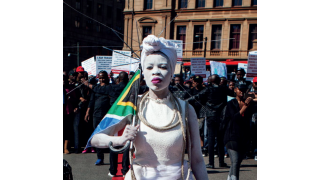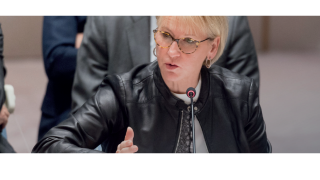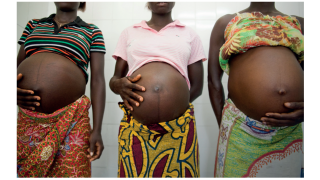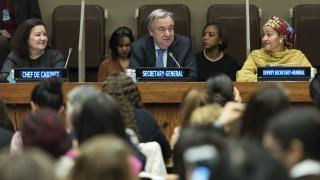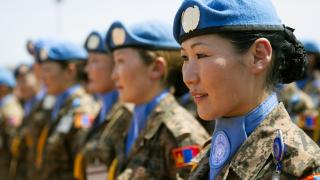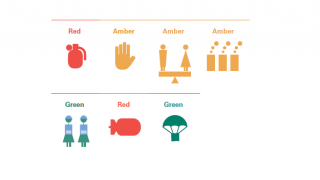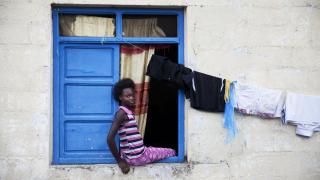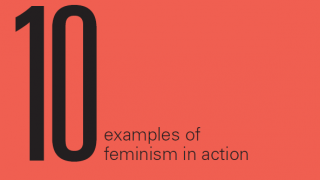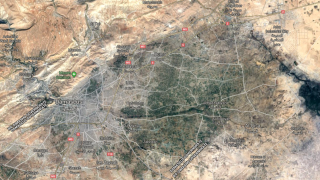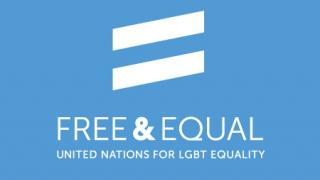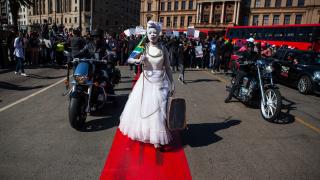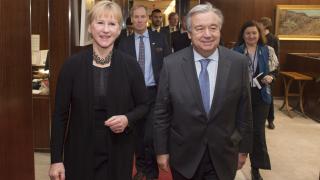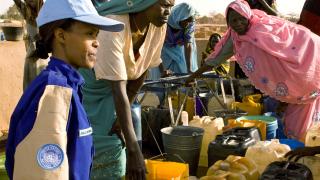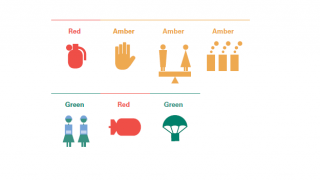
Addressing the UN General Assembly earlier this year, UK Prime Minister Theresa May set out a clear case for why multilateralism is so important – not just to the rest of the world, but to British interests and values.
Britain benefits hugely from the rules-based international system, and from the privileged position we have as a permanent member of the UN Security Council. We are as exposed to the risks of terrorism, cyber-crime, climate change, pandemics and nuclear war as any other country. Strengthening the United Nations, and thus the collective struggle against these threats, is not just altruism in the community of nations – it is squarely in our national interest.
Our international order is currently being tested as never before, with challenges from nuclear proliferation to climate change, from international terrorism to mass migration of peoples across borders and continents. What links these challenges structurally is that they stem from politicians acting in their countries’ – or their personal – short-term self-interest, as opposed to their long-term national interest. Too many leaders focus on extending their own electoral lives, rather than improving the lives of the citizens they serve.
Successive UK governments have been guilty of counterproductive short-termism. This has to stop if the rules our world relies upon are to be safeguarded and strengthened. So it is crucial that a British government that is serious about our global system takes the lead in developing a joined-up approach towards multilateralism.
UNA-UK’s research shows that the UK’s commendable contribution on UN peacekeeping and overseas aid has been tarnished, and its efficacy reduced, by consistent failure in the fields of arms control and nuclear disarmament. Meanwhile Britain’s record on preventing atrocities, tackling climate change and furthering human rights is mixed at best.
We have turned this research into a simple scorecard (see page opposite) to provide a snapshot of the UK’s performance in upholding the principles of a “global Britain”. Here are some key findings.
On arms control, the UK has prioritised making a quick buck over civilian lives, thus undermining the Arms Trade Treaty, one of the core building blocks of our international system. Over the past three years or so, the UK has licensed £3.6bn of weapons to Saudi Arabia. During that time the Saudi-led coalition has been identified as responsible for the majority of civilians killed in Yemen, now facing the world’s largest humanitarian crisis. It has also been criticised by the UN for its role in the deaths of children.
On nuclear disarmament, we are all rightly fixated on the dangers posed by an unstable North Korea. But Pyongyang’s emerging threat is a product of the weakness in our global non-proliferation system. This weakness will grow further if President Trump decides to do more damage to the Iranian Nuclear Deal and thus treat Iran, which the International Atomic Energy Agency has consistently found to have followed the rules, in the same manner as a state that does not. The Non-Proliferation Treaty is based on a bargain: non-nuclear states will not acquire weapons so long as nuclear states take active steps towards disarmament. And nuclear states, including the UK, have not been keeping up their side of the deal. When 122 nations recently met to approve a historic treaty banning nuclear weapons, the UK didn’t show up.
On climate change, the UK played an important role in bringing about the Paris Climate Agreement, but has scrapped its climate change department, and dragged its feet on implementation.
On human rights, the UK has played a largely positive role at the UN Human Rights Council. But too many politicians have treated UN experts with contempt and fanned the flames of anti-human rights sentiment at home. And on preventing atrocities, the UK’s record is mixed: too often political objectives have come before protecting civilians. You can find out more about all these issues, and make up your own mind about the Government’s record, via www.una.org.uk.
We hope that our scorecard, which will be regularly updated, will become an accessible way for people to measure the UK against its professed commitments to lead in strengthening multilateral rules and institutions. The safety, prosperity and health of our country, and our world, relies on us doing so.
Help us keep Britain Global
For the past six months, UNA-UK’s Keeping Britain Global campaign has been making the case that what’s good for the world, is good for the UK. What happens in far-away countries has the potential to affect British citizens. And decisions made in the UK can have huge repercussions abroad.
Our campaign looks at opportunities for the UK to contribute to the global good. It also scores the UK’s current performance in these areas, using independent sources – such as UN reports and cross-party parliamentary committees.
For the next stage in our campaign we need your support. Visit www.una.org.uk/takeaction and find out how you can help.
The UK's record
- Responsible arms trading: Red The UK’s practice of selling weapons to regimes with bad human rights records is undermining the Arms Trade Treaty. Civilians are paying the cost.
- Effective UN peacekeeping: Green The UK has made a significant contribution to UN peace-keeping. It must now encourage others to follow suit and support effective reforms.
- Preventing atrocities: Amber The UK’s record is mixed – as a permanent member of the UN Security Council, it bears particular responsibility for preventing genocide, ethnic cleansing and other atrocities.
- Multilateral nuclear disarmament: Red The UK is failing in its commitment to work for multilateral disarmament at a time of increasing nuclear threats.
- Respect for human rights: Amber The UK has largely been a positive force on the UN Human Rights Council. But inflammatory rhetoric and disdain for human rights by some politicians have marred its record.
- Support for overseas aid: Green The UK is a generous aid donor. Care must be taken to ensure aid goes where it is most needed – including underfunded UN humanitarian programmes.
- Tackling climate change: Amber The UK has ratified the Paris Climate Agreement but concerns are growing that the UK has de-prioritised climate action and is not on course to meet emissions targets.


